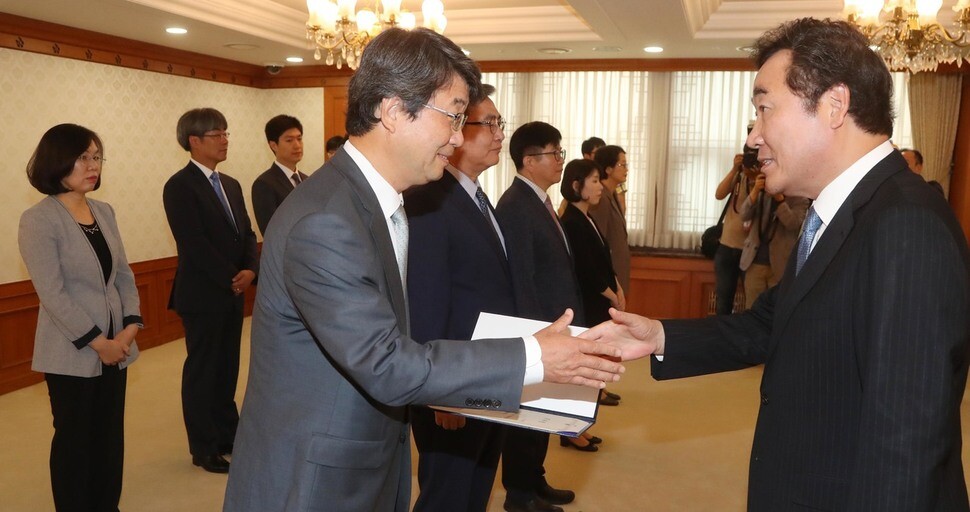hankyoreh
Links to other country sites 다른 나라 사이트 링크
[Editorial] Debate on Shin-Kori reactors a case study in deliberative democracy

July 24 marked the launch of the public debate committee that will basically decide whether construction on Shin-Kori nuclear reactors 5 and 6 will continue or end. The committee, which is composed of eight members and one chair, will be selecting the citizen jurors and overseeing the process of public debate by organizing various hearings and debates. The government has announced that it will pursue a long-term policy of phasing out nuclear power by halting operations at the current nuclear plants when their operational lifespan ends and by not building additional reactors. While the committee will be dealing with the question of what to do about Shin-Kori reactors 5 and 6, which are already under construction, the entire policy of nuclear energy will be the subject of the public debate. Whatever conclusion may result, this process needs to go down as a case study in deliberative democracy
To start with, the members of the public debate committee seem unobjectionable. The question of how the committee plans and coordinates the process of public debate will have a major effect on the final decision, and the committee was filled with figures who are neutral to nuclear energy policy to ensure impartiality. The representative organizations for and against nuclear energy were allowed to remove from the list the candidates they did not support. At the same time, these groups appointed figures with expertise in the areas of conflict management and statistics and research to ensure that they can effectively lead the public debate process.
If the members of the citizen jury are selected using an already verified method, ensuring impartiality should not be an issue. When the central government announced its plan to set up a public debate committee, it offered the example of the citizen communication committee in Germany that selected a site for a nuclear waste disposal facility. The jury was filled by surveying tens of thousands of people over the phone and then deriving a sample from them. The most important thing is for the jurors to be provided with adequate information so that they can reach a decision after careful consideration.
Previously, operators of nuclear plants and others who have had a direct interest in promoting nuclear energy have used their financial clout to run advertisements or mobilize groups of experts to unilaterally disseminate information that is favorable to them. The public debate committee must work hard to level this playing field. Korea Hydro & Nuclear Power and Korea Nuclear Energy Agency, which are state-run enterprises, should stop promoting nuclear power for the duration of the public debate. The government, the National Assembly and public institutions must provide as much information as possible.
A deliberative opinion poll of the jurors is part of the process of gathering the opinions of the South Korean public. It is essential that many South Koreans actively participate in the public debate so as to gain information, listen carefully to various opinions and voice rational opinions.
Please direct questions or comments to [english@hani.co.kr]

Editorial・opinion
![[Editorial] Japan’s rewriting of history with Korea has gone too far [Editorial] Japan’s rewriting of history with Korea has gone too far](https://flexible.img.hani.co.kr/flexible/normal/500/300/imgdb/original/2024/0422/1717137715201877.jpg) [Editorial] Japan’s rewriting of history with Korea has gone too far
[Editorial] Japan’s rewriting of history with Korea has gone too far![[Column] The president’s questionable capacity for dialogue [Column] The president’s questionable capacity for dialogue](https://flexible.img.hani.co.kr/flexible/normal/500/300/imgdb/original/2024/0422/1517137717613239.jpg) [Column] The president’s questionable capacity for dialogue
[Column] The president’s questionable capacity for dialogue- [Column] Are chaebol firms just pizza pies for families to divvy up as they please?
- [Column] Has Korea, too, crossed the Rubicon on China?
- [Correspondent’s column] In Japan’s alliance with US, echoes of its past alliances with UK
- [Editorial] Does Yoon think the Korean public is wrong?
- [Editorial] As it bolsters its alliance with US, Japan must be accountable for past
- [Guest essay] Amending the Constitution is Yoon’s key to leaving office in public’s good graces
- [Editorial] 10 years on, lessons of Sewol tragedy must never be forgotten
- [Column] A death blow to Korea’s prosecutor politics
Most viewed articles
- 1Korean government’s compromise plan for medical reform swiftly rejected by doctors
- 2[Column] The president’s questionable capacity for dialogue
- 3[Editorial] Japan’s rewriting of history with Korea has gone too far
- 4Samsung barricades office as unionized workers strike for better conditions
- 5[Reporter’s notebook] Did playing favorites with US, Japan fail to earn Yoon a G7 summit invite?
- 6[Column] The clock is ticking for Korea’s first lady
- 7Korea protests Japanese PM’s offering at war-linked Yasukuni Shrine
- 8All eyes on Xiaomi after it pulls off EV that Apple couldn’t
- 9[Column] Are chaebol firms just pizza pies for families to divvy up as they please?
- 10What Israel’s ‘warning shot’ response to Iran means for Middle East tensions